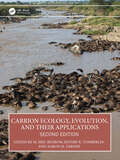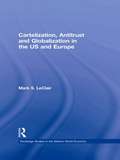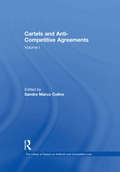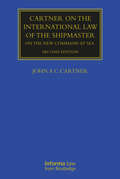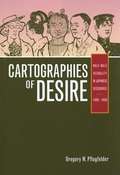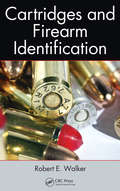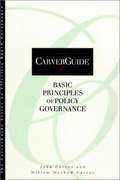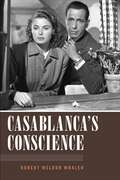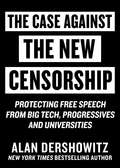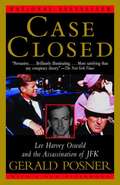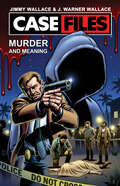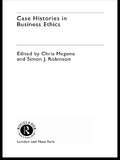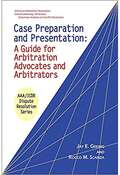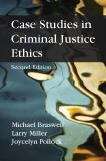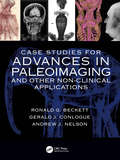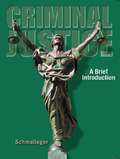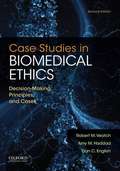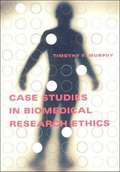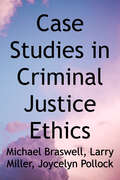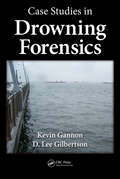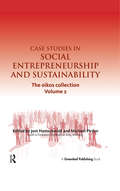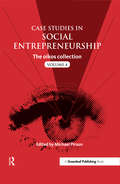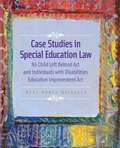- Table View
- List View
Carrion Ecology, Evolution, and Their Applications
by M. Eric Benbow, Jeffery K. Tomberlin, and Aaron M. TaroneThe first edition of Carrion Ecology, Evolution, and Their Applications brought together multiple scientific disciplines to shed light on the importance of carrion within the context of ecology and evolutionary biology, and through applications ranging from human mass disasters to habitat/ecosystem conservation. This second edition builds upon this foundation to include a huge amount of new research, consisting of 33 chapters—9 brand new and the remaining 24 substantially updated and expanded. One of the most significant changes for this edition is the coverage of aquatic ecosystems, both freshwater and marine.The book is now represented by 73 authors from eight countries, incorporating more diverse perspectives and engagement into this multidisciplinary and expanding science. The resulting new edition showcases a broader scope of topics, geographic areas, ecosystems and history of carrion ecology, evolution, and their applications for humanity. It provides the most comprehensive resource on carrion from all ecosystems of the world.The student, academic, and professional will find this book insightful, providing new insights for the fields of molecular ecology, microbiology, entomology, population biology, community and ecosystem ecology, as well as applications in forensics and human and environmental health.
Cartelization, Antitrust and Globalization in the US and Europe (Routledge Studies In The Modern World Economy Ser. #82)
by Mark S. LeClairThe uncovering of a great number of cartels in the industrialised world has left an unfortunate, yet significant, mark on global economic developments in recent years. Globalization has forced firms into more direct competition; the result has been global price-fixing. This situation has greatly challenged antitrust authorities. Taking a broad yet detailed approach, this work sets a practical explanation of the history of cartels and antitrust law in a sound theoretical framework, as well as providing suggestions as to how potential reforms of antitrust laws could improve the situation going forward. The book includes a comprehensive analysis of the motivations behind and perceived necessity for organisations to enter into cartels, and the success or otherwise of legislatures’ attempts to both uncover and prevent such cartels from taking place. A total of 24 price-fixing conspiracies uncovered in the US and Europe are examined as part of the analysis to demonstrate the globalization of collusion.
Cartels and Anti-Competitive Agreements: Volume I (The Library of Essays on Antitrust and Competition Law)
by Sandro Marco ColinoAntitrust is fast becoming a ’trending topic’, with over 120 countries having already adopted some form of competition legislation. This volume brings together carefully selected articles which reflect the evolution and progression of the regulation of joint conduct under competition law on both sides of the Atlantic, and which discuss principles of fundamental importance for antitrust law. The articles focus on various kinds of joint conduct between companies which might bear negative effects on competition, in particular on horizontal cartels and collusion between competitors. Attention is also paid to the debate surrounding the most adequate approach for vertical agreements, which take place between firms operating at different levels of production. Their effects on competition have traditionally been one of the most disputed issues in modern antitrust, and tend to divide the principal schools of thought that have influenced the evolution of competition policy around the world. The articles look primarily at two of the most established antitrust jurisdictions, namely the United States and the European Union. They discuss the general theoretical framework that has influenced the evolution of the law and policy; cover the most relevant practical developments; provide contrasting doctrinal views and pay particular attention to the main schools of thought that have influenced antitrust in the US and the EU; and are representative of the leading discussions in the course of antitrust history.
Cartels, Markets and Crime
by Bruce WardhaughThis study of the normative justification for the use of criminal sanctions as a means of cartel control goes beyond the historical and economic viewpoints by adding a normative evaluation of anti-cartel regimes and analysing cartel control in the USA, Europe and the UK. The analysis is unique in seeking to establish why, in a liberal society, criminal sanctions should apply to individuals who participate in this sort of activity. Although cartels have been rhetorically likened to theft and fraud, there are significant differences. Notwithstanding these differences, Cartels, Markets and Crime presents an argument for the criminalisation of economic collusion and, with this argument in mind, analyses the regimes of the USA, EU and UK and considers the possibility of global convergence.
Cartner on the International Law of the Shipmaster: On The New Command at Sea (Maritime and Transport Law Library)
by John A. CartnerThis unique book rethinks and rewrites the previous edition. It categorises simply the nine interactive legal duties of the shipmaster, analysing and relating them to laws and conventions within a single volume. Cartner on the International Law of the Shipmaster contends that command depends on decision-making, and that shipmasters are not provided sufficient, timely, relevant, and pertinent information for command decisions. The book proposes voyage planning follow the spacecraft model of the USA's National Aeronautics and Space Administration, providing readers with a metric for command. It constructively criticises the conventions and management and is aimed at reducing catastrophes by focusing on the hitherto elusive human factor in the shipmaster. Cartner proposes that command at sea be its own profession and discipline with those called to it specifically trained in its intricacies; he argues that current ships are not designed to be command-worthy or security-worthy and that management should reorder its relationships with shipmasters as tactical managers afloat. The insights the book provides are an invaluable aid to decision making for the modern civil commander and anyone association with this pivotal and essential profession. This book is a necessary reference and guide for shipmasters, technologists, naval architects, regulators, underwriters, students, practitioners and courts of maritime law and command worldwide.
Cartographies Of Desire: Male-male Sexuality In Japanese Discourse, 1600-1950
by Gregory M. PflugfelderIn this sweeping study of the mapping and remapping of male-male sexuality over four centuries of Japanese history, Gregory Pflugfelder explores the languages of medicine, law, and popular culture from the seventeenth century through the American Occupation. Pflugfelder opens with fascinating speculations about how an Edo translator might grapple with a twentieth-century text on homosexuality, then turns to law, literature, newspaper articles, medical tracts, and other sources to discover Japanese attitudes toward sexuality over the centuries. During each of three major eras, he argues, one field dominated discourse on male-male sexual relations: popular culture in the Edo period (1600-1868), jurisprudence in the Meiji period (1868-1912), and medicine in the twentieth century. This multidisciplinary and theoretically engaged analysis will interest not only students and scholars of Japan but also readers of gay studies, literary studies, gender studies, and cultural studies.
Cartridges and Firearm Identification
by Robert E. WalkerAt a time when crime scene television shows are all the rage amongst the civilian population, knowledge of firearm forensics is of paramount importance to crime scene analysts, police detectives, and attorneys for both the prosecution and the defense. Cartridges and Firearm Identification brings together a unique, multidisciplined approach to quest
Carverguide, Basic Principles Of Policy Governance
by John Carver Miriam Mayhew CarverOffers board members a clear understanding of the concepts and principles that are at the very heart of John Carver's innovative Policy Governance model. Presents the guidelines needed to transform your board members into a unified group that consistently makes powerful contributions to its organization.
Casablanca's Conscience
by Robert Weldon WhalenA new look at a beloved classic film that explores the philosophical dynamics of CasablancaCelebrating its eightieth anniversary this year, Casablanca remains one of the world’s most enduringly favorite movies. It won three Academy Awards for Best Picture, Best Director, and Best Adapted Screenplay. It is still commonly quoted: “We’ll always have Paris” and “Here’s looking at you, kid” And who can forget, “You must remember this…a kiss is just a kiss.” Yet no one expected much to come of this little film, certainly not its blockbuster stars or even the studio producing it. So how did this hastily cranked-out 1940s film, despite its many limitations, become one of the greatest films ever made? How is it that year after year, decade after decade, it continues to appear in the lists of the greatest movies ever produced? And why do audiences still weep when Rick and Ilsa part? The answer, according to Casablanca’s Conscience, is to paraphrase Rick, “It’s true.”Much has already been written about the film and the career-defining performances of Bogart and Bergman. Casablanca is an epic tale of love, betrayal, and sacrifice set against the backdrop of World War II. Yet decades later, it continues to capture the imagination of filmgoers. In Casablanca’s Conscience, author Robert Weldon Whalen explains why it still resonates so deeply. Applying a new lens to an old classic, Whalen focuses on the film’s timeless themes—Exile, Purgatory, Irony, Love, Resistance, and Memory. He then engages the fictional characters—Rick, Ilsa, and the others—against the philosophical and theological discourse of their real contemporaries, Hannah Arendt, Dietrich Bonhoeffer, and Albert Camus. The relationships between fictional and historical persons illuminate both the film’s era as well as perennial human concerns. Both the film and the work of the philosophers explore dimensions of the human experience, which, while extreme, are familiar to everyone. It’s the themes that resonate with the viewer, that have sustained it as an evergreen classic all these years.
Case Against Vaccine Mandates
by Kent HeckenlivelyKent Heckenlively, New York Times bestselling author of Plague of Corruption, calls upon both common sense and legal precedence to fight against vaccine mandates around the country. "My body, my choice!" used to be the rallying cry of the left in the abortion fight. But now this same principle of bodily autonomy is the central argument of conservatives, such as that of Florida Governor Ron DeSantis in fierce opposition to so-called "vaccine passports," which would limit whether an individual could attend movies or other public events, work, or even go to school, if they chose to decline a COVID-19 vaccine. While cities like New York close their doors to unvaccinated people, the fight against vaccine mandates is cobbling together an unexpected alliance across the political spectrum, such as the Black mayor of Boston, Kim Janey, who recently claimed, "there's a long history" in this country of people "needing to show their papers" and declaring any such passport as akin to slavery. The starting point agreed upon by all parties as to whether the government can bring such pressure to bear upon individuals is the 1905 US Supreme Court of Jacobson v. Massachusetts. In that case, a Lutheran pastor declined a smallpox vaccination and was fined $5, the equivalent of a little more than $150 in today's currency, or less than many traffic tickets. The Jacobson case sparked a shameful legacy in American jurisprudence, being used as the sole reasoning by the US Supreme Court to allow the forced sterilization of a female psychiatric patient in 1927. This ruling paved the way for the involuntary sterilization of more than sixty thousand mental patients and gave legal justification to the eugenics movement, one of the darkest chapters in American medicine. In The Case Against Vaccine Mandates, New York Times bestselling author Kent Heckenlively, whose books have courageously taken on Big Pharma, Google, and Facebook, now points his razor sharp legal and literary skills against vaccine passports and mandates, which he believes to be the defining issue as to whether we continue to exist as a free and independent people.
Case Against the New Censorship: Protecting Free Speech from Big Tech, Progressives, and Universities
by Alan DershowitzIn The Case Against the New Censorship: Protecting Free Speech from Big Tech, Progressives, and Universities, Alan Dershowitz—New York Times bestselling author and one of America&’s most respected legal scholars—analyzes the current regressive war against freedom of speech being waged by well-meaning but dangerous censors and proposes steps that can be taken to defend, reclaim, and strengthen freedom of speech and other basic liberties that are under attack. Alan Dershowitz has been called &“one of the most prominent and consistent defenders of civil liberties in America&” by Politico and &“the nation&’s most peripatetic civil liberties lawyer and one of its most distinguished defenders of individual rights&” by Newsweek. He is also a fair-minded and even-handed expert on the Constitution and our civil liberties, and in this book offers his knowledge and insight to help readers understand the war being waged against free speech by the ostensibly well-meaning forces seeking to constrain this basic right. The Case Against the New Censorship is an analysis of every aspect of the current fight against freedom of speech, from the cancellations and deplatformings practiced by so-called progressives, to the powerful, seemingly arbitrary control exerted by Big Tech and social media companies, to the stifling of debate and controversial thinking at public and private universities. It assesses the role of the Trump presidency in energizing this backlash against basic liberties and puts it into a broader historical context as it examines how anti-Trump zealots weaponized, distorted, and weakened constitutional protections in an effort to &“get&” Trump by any means. In the end, The Case Against the New Censorship represents an icon in American law and politics exploring the current rapidly changing attitudes toward the value of free speech and assessing potential ways to preserve our civil liberties. It is essential reading for anyone interested in or concerned about freedom of speech and the efforts to constrain it, the possible effects this could have on our society, and the significance of both freedom of speech and the battle against it in a greater historical and political context.
Case Closed: Lee Harvey Oswald and the Assassination of JFK
by Gerald PosnerThe assassination of John F. Kennedy on November 22, 1963, continues to inspire interest ranging from well-meaning speculation to bizarre conspiracy theories and controversial filmmaking. But in this landmark book,reissued with a new afterword for the 40th anniversary of the assassination, Gerald Posner examines all of the available evidence and reaches the only possible conclusion: Lee Harvey Oswald acted alone. There was no second gunman on the grassy knoll. The CIA was not involved. And although more than four million pages of documents have been released since Posner first made his case, they have served only to corroborate his findings. Case Closedremains the classic account against which all books about JFK's death must be measured.
Case Files Vol. I: Murder and Meaning
by J. Warner Wallace Jimmy WallaceThis full-color, high-quality graphic novel from two law enforcement experts presents a case for a Christian worldview through an entertaining action-adventure story. Detective Michael &“Murph&” Murphy is near retirement. After twenty-five years as a sworn peace officer in Los Angeles County, he&’s wondering what will keep him busy next. He finds his mind drifting as he joins his team—with a few newbies along—to comb the cliffs of San Pedro for any clues to a recent murder there. But when a fresh murder in Palos Verdes occurs, and a mysterious subject starts calling the police department to talk to Murph, the stakes get higher. A third killing leads the team to suspect one person is behind all the murders—and still on the loose. Worse, the crimes have happened at one-week intervals, which means Murph and his colleagues have only a few days left to keep the killer from striking again …. This highly engaging, full-color graphic novel for adults is one of the first available that Christian comic book enthusiasts can feel great about reading and recommending to friends. Written by the real-life detectives and Christian apologists behind Cold-Case Christianity, and featuring art from the renowned creators of The Chosen comic book series, Case Files: Murder and Meaning has all the action and intrigue comic book readers want laced with questions about the purpose and value of human life.
Case Histories in Business Ethics
by Simon J. Robinson Chris MegoneCase Histories in Business Ethics illustrates and extends the role of case histories in the teaching and study of business ethics. Typically, case histories are used to illustrate assertions or arguments, or to stimulate debate about an issue within business ethics. This volume examines that role, illustrating the link between case histories and mo
Case Preparation and Presentation: Guide for Arbitration Advocates and Arbitrators
by Jay E. Grenig Rocco M. ScanzaArbitration advocates uniformly place great emphasis on case preparation. Case Preparation and Presentation: A Guide for Arbitration Advocates and Arbitrators can be used to help prepare parties and their advocates in a wide range of arbitration cases including labor, employment and commercial arbitrations and will provide lawyers and non-lawyers alike with the focus and direction to maximize their chances of obtaining a good result in arbitration. <p><p> In this book readers will find coverage on the following topics: Developing a case theory and case theme Commencing the arbitration process Selecting an arbitrator and scheduling the hearing Evaluating and presenting evidence Preparing for the arbitration hearing Conducting the arbitration hearing Making and responding to objections Examination and cross-examination of witnesses
Case Studies In Criminal Justice Ethics (Second Edition)
by Larry Miller Michael Braswell Joycelyn PollockBuilding on the success of the popular first edition, the authors provide hypothetical criminal justice scenarios for analysis, having found in their experience as teachers that the process adds depth and dimension to the study of justice and ethics. This expanded second edition offers ten new cases addressing the intricate process of moral and ethical decision making. Focusing on both personal and social context, the authors explore true-to-life situations and encourage readers to think about the possible consequences that could result from the choices they make. The case studies provide realistic portrayals of current dilemmas in policing, courts, corrections, and juvenile justice. Political and noble cause corruption, perjury and judicial/prosecutorial misconduct, ethnic and gender prejudice, and many other social and criminal justice themes are featured. Following each scenario are thought-provoking questions to facilitate personal reflection and class discussion. Each section contains a bibliography of topical books and articles for readers interested in a more in-depth treatment of the issues.
Case Studies for Advances in Paleoimaging and Other Non-Clinical Applications
by Ronald G. Beckett Gerald J. Conlogue Andrew NelsonThe case studies provided in Case Studies for Advances in Paleoimaging will provide the reader with real-world scenarios and case examples that will help prepare researchers to discover new ways to apply the various modalities associated with the technology. This book is a follow-up to the Beckett and Conlogue’s classic work Paleoimaging (2009) and companion to their new contribution Advances in Paleoimaging (2020). The case studies outlined demonstrate the problem-solving nature of imaging research and the application of critical thought to unique problems. Further, Case Studies for Advances in Paleoimaging demonstrates the incredible depth of application of these modalities including photography, endoscopy, x-ray fluorescence, plane radiography, digital radiography, and advanced imaging modalities like multi-detector computed tomography, micro-computed tomography, and magnetic resonance imaging. Of particular note, case study seven, Contrast Media Injections, informs the researcher regarding methods to bring out specific anatomic structures that may be the target of a given research question. Intended for students, faculty, and seasoned researchers, Case Studies for Advances in Paleoimaging presents actual cases from the authors’ vast experience in the application of paleoimaging modalities in order to answer unique research problems. The book also serves as a field manual for current and future researchers as they approach similar or new cases that present unique challenges. These cases demonstrate how the varied imaging methodologies can provide data which greatly enriches our understanding of the subject at hand, be it ancient cultural remains, forensic recovery, museum holdings, or other anthropological and archaeological artifacts.
Case Studies in Abnormal Behavior
by Frank SchmallegerTopics discussed: anxiety disorders, sleep disorders, sexual disorders, delusional disorders, depression, substance abuse, violence, eating disorders, among others.
Case Studies in Biomedical Ethics: Decision-Making, Principles, and Cases
by Amy Haddad Robert Veatch Dan English<p>The most comprehensive and up-to-date collection of its kind, Case Studies in Biomedical Ethics: Decision-Making, Principles, and Cases, Second Edition, explores fundamental ethical questions arising from real situations faced by health professionals, patients, and others. <p>Featuring a wide range of more than 100 case studies drawn from current events, court cases, and physicians' experiences, the book is divided into three parts. Part 1 presents a basic framework for ethical decision-making in healthcare, while Part 2 explains the relevant ethical principles: beneficence and nonmaleficence, justice, respect for autonomy, veracity, fidelity, and avoidance of killing. Parts 1 and 2 provide students with the background to analyze the ethical dilemmas presented in Part 3, which features cases on a broad spectrum of issues including abortion, mental health, experimentation on humans, the right to refuse treatment, and much more. The volume is enhanced by opening text boxes in each chapter that cross-reference relevant cases in other chapters, an appendix of important ethical codes, and a glossary of key terms.</p>
Case Studies in Biomedical Research Ethics
by Timothy F. MurphyThis textbook for instruction in biomedical research ethics can also serve as a valuable reference for professionals in the field of bioethics. The 149 cases included in the book are grouped in nine chapters, each of which covers a key area of debate in the field. Some of the case studies are classics, including the famous cases of the Tuskegee Syphilis Study (in which subjects with syphilis were not given treatment) and the Willowbrook hepatitis studies (in which institutionalized subjects were intentionally exposed to hepatitis). Others focus on such current issues as human embryonic stem cell research, cloning by somatic nuclear transfer, and the design and function of institutional review boards. Each chapter begins with a brief introduction that places the issues raised in context; this is followed by a number of cases (each of which is no more than a few pages). Study questions meant to encourage further discussion follow each case. After an introductory discussion of the history and tenets of ethics in medical research, the book's chapters cover the topics of oversight and study design; informed consent; the selection of subjects; conflicts of interest; the social effects of research; embryos, fetuses, and children; genetic research; the use of animals; and authorship and publication. Following these chapters are appendixes with the texts of the Nuremburg Code and the World Declaration of Geneva, two key documents in the establishment of bioethical standards for research. Also included are a glossary, a table of cases by general category, and an alphabetical listing of cases.
Case Studies in Criminal Justice Ethics
by Larry Miller Michael Braswell Joycelyn PollockEthical conflicts rarely involve clear-cut choices. Decision making in ambiguous circumstances challenges personal values and professional ethics. The fog of politics, personal bias, and past experiences factor into the choices made. The goal of this compelling collection of cases is to stimulate reflection about the ethical dilemmas encountered in interactions. Thought-provoking case studies address police misconduct, protests and civil unrest, school resource officers, questionable prosecutorial practices, the challenges of a pandemic for prisons, the influence of politics, ethnic/gender/sexual preference bias, family conflict, immigration, perceptions of terrorism, and executing someone who may be innocent. <p><p>The experiential approach presents readers with opportunities to think about decisions they might have to make as criminal justice professionals. People employed in criminal justice have a great deal of power and discretion, which can be used ethically or unethically. Introductions to the sections on law enforcement, the courts, corrections, and juvenile justice provide background for analyzing the hypothetical scenarios. Case commentaries and questions provoke discussion about potential courses of action and the consequences of various choices.
Case Studies in Drowning Forensics
by Kevin Gannon D. Lee GilbertsonWhen a corpse is found in a body of water, authorities generally presume that the manner of death was either an accident or a suicide. They do not treat the recovery site as a potential crime scene or homicide, so many cases remain unsolved. Case Studies in Drowning Forensics investigates the cases of 13 bodies recovered from water in similar circu
Case Studies in Social Entrepreneurship and Sustainability: The oikos collection Vol. 2
by Michael Pirson Jost Hamschmidt Marina KimIn 2008, Ashoka launched the "Changemaker Campus Initiative" which applies Ashoka's rigorous criteria to select and support universities as they develop and implement a comprehensive social entrepreneurship plan. Through the lessons learned from this network, and with input from its broader global network of those experienced in the field, Ashoka aims to set a new standard for social entrepreneurship education. Indeed, despite the rising demand, there remains a dire need for quality coursework and global teaching case studies. Social entrepreneurs – and the pressing challenges they solve – are not bound by geographic borders or a single political environment, yet there is a lack of the materials necessary to equip students with the skills and mind-set required to catalyze systemic social change. What few high-quality case studies do exist typically highlight social entrepreneurs within the United States. This cooperation with oikos within the Social Entrepreneurship Track of the annual oikos Global Case Competition is a critical vehicle for tackling that challenge. As a result of this effort, more locally relevant case studies are being written, peer-reviewed, and judged than ever before, and are able to make their way into the hands of global audiences eager to adopt them into their courses. Building social entrepreneurship skills and problem-solving abilities are best practiced and honed using real-life examples and strategic challenges – not just learning theories in a vacuum. Case studies provide this exposure and real-time training in systemic problem-solving. Through these 15 teaching cases, students learn that social entrepreneurship is about identifying root causes of problems and applying a solution that tackles the system. As study upon study has shown, the band-aid approach does not work. To effectively address a social problem, the solution must continually adapt and evolve based on market feedback about what works and what needs to change in the model. Case Studies in Social Entrepreneurship and Sustainability is the second volume resulting from the oikos Global Case Writing Competition – an annual program launched in 2003 to promote the publication of high-quality teaching cases in corporate sustainability. This book expands the collection with award-winning global cases in the rapidly growing field of social entrepreneurship and sustainability. In view of the growing importance of various sustainability trends, management schools are increasingly challenged to adapt their entrepreneurship and business curricula. Management education needs to reflect the trends and provide a broadened understanding of value creation. Sustainability is a concept that demands that organizations consider the legitimate expectations of different stakeholders in their value creation processes. At the same time, it underlines the fact that many sustainability trends offer new business opportunities that entrepreneurs will seize. As a result, value creation processes need to be reorganized in order to create economic capital while developing social capital and preserving natural capital. Indeed, entrepreneurial organizations are increasingly dealing with these challenges. The case studies in this book explore both the opportunities and pitfalls entrepreneurs – working with organizations with for-profit, hybrid and non-profit business models – face in targeting sustainability issues and how their values and core assumptions impact their business strategies. They describe new patterns of value creation, new alliances, and the challenges of dealing with existing paradigms. It is clear that new ways of doing business with a common objective of maximizing social impact are substantially shaping markets and society. This textbook of competition-winning case studies for management education in the field of social entrepreneurship and sustainability provides excellent learning opportunities, tells engaging stories, deals with recent situations, includes quotations from key actors, is
Case Studies in Social Entrepreneurship: The oikos collection Vol. 4
by Michael PirsonThis book is an essential resource for the increasing number of facilitators who wish to help students learn about the promise and pitfalls of social enterprise. The oikos-Ashoka case competition for social entrepreneurship was conceived in 2007 as a way to help find great material and case studies in this emerging field. This fourth collection of oikos case studies is based on the winning cases from the 2010 to 2014 annual case competitions. These cases have been highly praised because they provide excellent learning opportunities, tell engaging stories, deal with recent situations, include quotations from key actors, are thought-provoking and controversial, require decision-making and provide clear take-aways. This new volume of social entrepreneurship case studies highlights cases from around the globe authored by teachers from around the globe. The selected cases span many industries and geographic contexts; nevertheless, they are connected by a shared ambition: to highlight the power of entrepreneurship to solve social problems. The cases are clustered in three different sections: Socially oriented Enterprise Cases – Health and Fair trade, Ecologically oriented social enterprises, and Corporate Social Entrepreneurship. Case Studies in Social Entrepreneurship will be an essential purchase for educators and is likely to be a widely used as a course textbook at all levels of management education. Online Teaching Notes to accompany each chapter are available on request with the purchase of the book.
Case Studies in Special Education Law: No Child Left Behind Act and Individuals with Disabilities Education Improvement Act
by Mary Konya WeishaarEighteen case studies capture important issues within the IDEA and NCLB legislations and provide real-life context for studying special education and the law. Topics include accountability; participation in high stakes assessment; the referral and pre-referral process; zero reject, child find and discipline; nondiscriminatory assessment; appropriate education and IEPs; least restrictive environment; due process; and parent participation. Readers will see a variety of students, issues and interventions (both best practice and less than best practice) and have opportunities to examine the legal issues and other issues behind each case.
